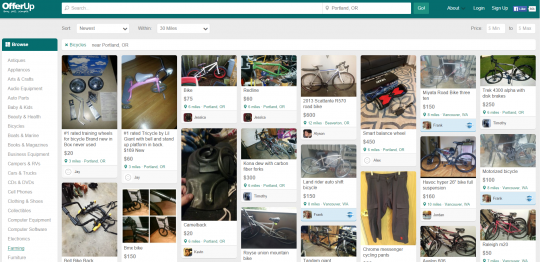
A new crop of well-funded Craigslist competitors has some anti-bike-theft organizers smelling an opportunity.
Craigslist, the San Francisco-based classifieds website founded in 1995, is a common venue for reselling stolen bikes, in part because it does almost nothing to regulate the goods people buy and sell.
“Craigslist is a freaking wall a mile high,” said Bryan Hance, the Portland-based operator of the anti-theft service BikeIndex.org. “They just don’t do anything with anybody. They just don’t care.”

trying to build partnerships.
(Photo © J. Maus/BikePortland)
In an interview last week, Hance (who’s been using digital tools to fight bike theft for years) said he’s tried multiple times to persuade the site to take some steps against bike theft, even having “some heated exchanges” with Craigslist employees he’d encountered personally in San Francisco.
It’s easy to see why he’s passionate. Making it harder to resell a stolen bike on Craigslist or elsewhere would attack the revenue of bike thieves rather than resorting to one-off enforcement. But that’s easier said than done.
“I think the only response we’ve gotten from Craigslist is that ‘we’re already dealing with so many stolen things that are more valuable than bikes,'” Hance said. “And it’s like, Wow, that is not a good answer!”
Craigslist didn’t respond to a request for comment Wednesday.
Hance dreams of a day when Craigslist and similar sites would employ anti-theft teams large enough to block people who have in the past been caught selling stolen goods, or to require all bike sellers to include the serial number of the bike they’re selling, or to at least give user information to police officers on the rare occasion that one is investigating a bike theft.
“What if I show you an email where I say I want you to send me the serial number and they say no?” Hance asked, rhetorically. “What are you going to do? Are you going to shut that guy down? Because I want to shut them down. … I want that guy not to be able to sell stuff online.”
It’s been a fruitless effort. But now, 10 years after it singlehandedly took over the national classifieds market, Craigslist is facing new competition. And Hance is wondering if one of them could be the modern classified industry’s chance for a do-over.
Advertisement
Some of the new services: OfferUp, VarageSale, Wallapop, Letgo. All are designed to work well on mobile devices, which account for about a third of global web traffic. (That doesn’t count mobile apps, which all the newer companies offer. Craigslist, by contrast, simply makes its listings available to third-party apps.)
“They’re just clones of each other, and they’re just exploding in popularity and traffic, and I think people like them better because they’re just pictures,” Hance said. “It’s Pinterest but you can buy stuff. It’s just a different user experience.”

OfferUp, based in Seattle, seems to be one of the largest of the new set. It made its first big media splash last month when its executives started publicly discussing the more than $90 million they’ve raised in venture capital, and the $3 billion in transactions they’ve handled this year.
OfferUp’s service depends on its app’s ability to easily upload photos of goods for sale. Hance wonders if the company could require all bike sales to include a photo of the bike’s serial number, which would make it easy for a buyer to check the serial number against stolen-bike databases.
Just as Portland is among the first set of U.S. cities to impose regulations on ride-hailing service like Uber, it could theoretically put rules on goods-selling services like Craigslist or OfferUp.
Hance said he’s had some promising interactions with OfferUp, so at his recommendation I contacted them last Thursday. But despite a prompt response from the company’s spokesman, no one at the company (which reportedly employed 67 people as of last month) could find time over the last week to answer questions by phone or email about possible anti-theft measures.
If companies like OfferUp aren’t willing to go out of their way to reduce theft, there’s another possibility: governments could require them to do so. Just as Portland is among the first set of U.S. cities to impose regulations on ride-hailing service like Uber, it could theoretically put rules on goods-selling services like Craigslist or OfferUp.
Of course, that would require the city to pay people to enforce the rules — something Portland is funding, in Uber’s case, by putting a fee on all rides. For a free service like OfferUp’s, that’d be harder.
Hance said that duty once fell to the Portland Police Bureau, but it was eliminated for other priorities.
“Portland used to have six dudes that just did stuff like this, that chased stolen stuff online,” Hance said. “This is all they did, is just hunt the stolen stuff down.”
Chad Stover, a staffer for Portland Mayor Charlie Hales who has been involved in the city’s efforts to fight bike theft, said Wednesday that the notion of regulating online sellers was floated in one meeting of the city’s Bike Theft Task Force, but hasn’t come up since.
As for fighting bike theft in general, Stover said, “we’re all for that and to continue that dialogue.”
— Michael Andersen, (503) 333-7824 – michael@bikeportland.org

